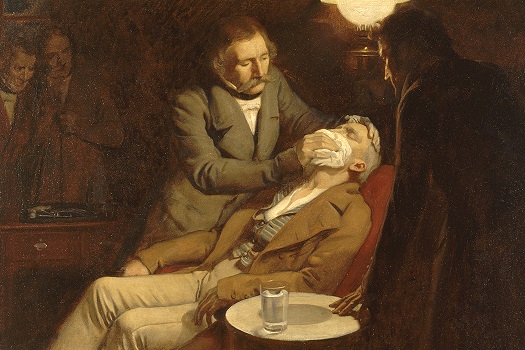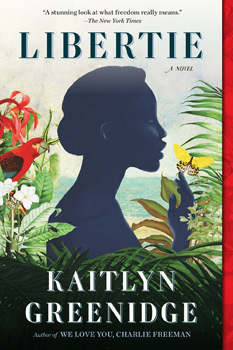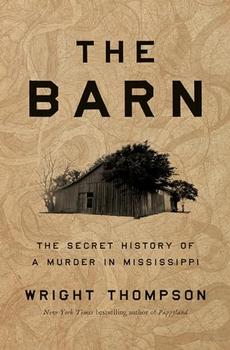Summary | Excerpt | Reading Guide | Discuss | Reviews | Beyond the book | Read-Alikes | Genres & Themes | Author Bio

The story of one woman who believed in scientific medicine before the world believed in her.
Raised by the eccentric surgeon Dr. Horace Croft after losing her parents to a deadly pandemic, the orphan Nora Beady knows little about conventional life. While other young ladies were raised to busy themselves with needlework and watercolors, Nora was trained to perfect her suturing and anatomical illustrations of dissections.
Women face dire consequences if caught practicing medicine, but in Croft's private clinic Nora is his most trusted―and secret―assistant. That is until the new surgical resident Dr. Daniel Gibson arrives. Dr. Gibson has no idea that Horace's bright and quiet young ward is a surgeon more qualified and ingenuitive than even himself. In order to protect Dr. Croft and his practice from scandal and collapse Nora must learn to play a new and uncomfortable role―that of a proper young lady.
But pretense has its limits. Nora cannot turn away and ignore the suffering of patients even if it means giving Gibson the power to ruin everything she's worked for. And when she makes a discovery that could change the field forever, Nora faces an impossible choice. Remain invisible and let the men around her take credit for her work, or let the world see her for what she is―even if it means being destroyed by her own legacy.
Paperback Original
PROLOGUE
Hefting his black bag, Dr. Horace Croft stumped down the uneven pavement. Despite the afternoon sunshine, the street was silent and the air thick with fear. Shop doors were shut and bolted, and too many anxious faces watched from the windows. For fifteen years London had dreaded the cholera. Now it had come.
Croft had tried to prepare, studying initial reports of the epidemic from India, Russia, and Japan. An irreligious man, he gave silent prayers of relief when the outbreak of 1827 died in the Caucasus before reaching Europe. Foolish of him. Four years later, the deadly disease advanced from the dark forests of the East into the shadowy Balkans. The following year it breached England's rocky shores. Miraculously, the outbreak was contained in Sunderland, but this was respite, not reprieve. Three months later, the disease erupted in London.
He'd paid ten calls already today, all within a mile of each other. He frowned, still troubled by the last.
Jemmy Watt had first sent ...
Here are some of the comments posted about The Girl in His Shadow.
You can see the full discussion here.
Can the respect of a mentor and care of a devoted housekeeper supplant parental affection?
I agree that they were family but still with a sense of loss of Nora's parents and siblings. - bill
Can you disapprove of a person without disapproving of their upbringing?
As a child, your upbringing is not within your control - how could you hold that against someone? You can however disapprove of the adult’s behavior - upbringing is not an excuse for bad behavior - you can be sympathetic and understanding ... - christinec
Compare Daniel's relationship with Mae and his relationship with Nora. How are they different? Are they similar in any way?
Based on her looks and social standing, Daniel appeared to be in love with Mae and, based on her letters, it appeared that Mae was in love with Daniel. However, it appeared that Mae was controlled by her parents, who like Daniel's parents, were... - bill
Do you see any parallels between Nora's situation in the nineteenth century and today?
Yes for many of the reason above but definite improvement from actions taken by women and men with actions such as the suffragette movement and in the courts with Ruth Bader Ginsburg and other male and female lawyers and judges. - bill
Do you think "disciple" is the right word to describe what Nora is to Croft? Do you think it’s better to pledge yourself to an ideal or to another person?
Don’t like word disciple - devoted to and respected and loved him - believed in his work and felt he was selfless in wanting to help people - - christinec
While the authors successfully mix different aspects of story and genre, the novel falls short in its feminist ambitions. Nora is an embodiment of the fairly simplistic modern fantasy of a "strong woman" type overcoming obstacles, and not particularly interesting. The Girl in His Shadow still has much to recommend it. The real star of the book is the burgeoning scientific knowledge of the day, which is woven seamlessly into the plot, such that the reader feels caught up in the excitement of the possibilities that surround the characters as they experiment with emerging treatments and battle limitations imposed by the traditional medical establishment...continued
Full Review
 (616 words)
(616 words)
(Reviewed by Elisabeth Cook).
 Gloria Goldreich, author of The Paris Children
A suspenseful story of a courageous young woman determined to become a surgeon in repressive Victorian England. Fluidly written, impeccably researched, The Girl in His Shadow is a memorable literary gift to be read, reread, and treasured.
Gloria Goldreich, author of The Paris Children
A suspenseful story of a courageous young woman determined to become a surgeon in repressive Victorian England. Fluidly written, impeccably researched, The Girl in His Shadow is a memorable literary gift to be read, reread, and treasured. Tracey Enerson Wood, international bestselling author of The Engineer's Wife
In The Girl in His Shadow, Audrey Blake takes the reader on an exquisitely detailed journey through the harrowing field of medicine in mid-19th century London. Nora, the ward of the eccentric and brilliant surgeon Horace Croft, learns far more than any woman is allowed. Bravely saving lives while risking her own, she defies the law to pioneer breakthroughs in medicine.
Tracey Enerson Wood, international bestselling author of The Engineer's Wife
In The Girl in His Shadow, Audrey Blake takes the reader on an exquisitely detailed journey through the harrowing field of medicine in mid-19th century London. Nora, the ward of the eccentric and brilliant surgeon Horace Croft, learns far more than any woman is allowed. Bravely saving lives while risking her own, she defies the law to pioneer breakthroughs in medicine. In The Girl in His Shadow by Audrey Blake, Nora and Daniel use diethyl ether, referred to simply as "ether," to render a patient unconscious in order to perform a surgical procedure on him. While the procedure is ultimately successful, the characters are still unsure of the exact effects of the drug. Nora and Daniel's study of and experimentation with ether is reflective of the murky medical knowledge of the substance available to physicians at the time. Ether ultimately became the first general anesthetic to see wide recorded use in surgery.
In The Girl in His Shadow by Audrey Blake, Nora and Daniel use diethyl ether, referred to simply as "ether," to render a patient unconscious in order to perform a surgical procedure on him. While the procedure is ultimately successful, the characters are still unsure of the exact effects of the drug. Nora and Daniel's study of and experimentation with ether is reflective of the murky medical knowledge of the substance available to physicians at the time. Ether ultimately became the first general anesthetic to see wide recorded use in surgery.
Before general anesthetics, or drugs that allow for the controlled induction of total unconsciousness, those performing invasive medical procedures such as surgery relied on sedatives (substances ...

If you liked The Girl in His Shadow, try these:

by Ritu Mukerji
Published 2024
For fans of Jacqueline Winspear and Charles Todd, Murder by Degrees is a historical mystery set in 19th century Philadelphia, following a pioneering woman doctor as she investigates the disappearance of a young patient who is presumed dead.

by Kaitlyn Greenidge
Published 2022
Set in the Reconstruction era, this unforgettable story explores one young Black woman's attempt to find a place where she can be fully herself – out of the shadow of her accomplished mother in Brooklyn and her traditional husband in Haiti. Perfect for readers of Brit Bennett, Min Jin Lee, and Yaa Gyasi.




The thing that cowardice fears most is decision
Click Here to find out who said this, as well as discovering other famous literary quotes!